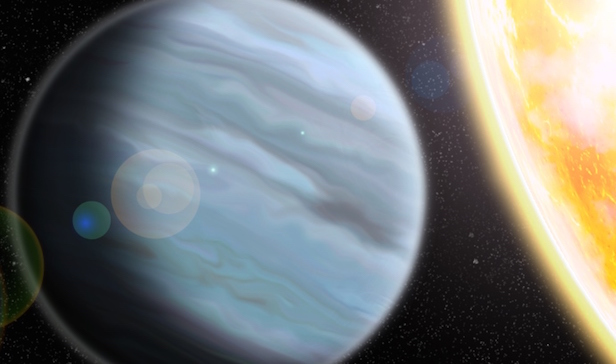Exoplanet with density of Styrofoam discovered 320 light years away
Puffed-up planet KELT-11b could help astronomers understand the evolution of highly-inflated worlds

This artist’s impression depicts KELT-11b, the ‘Styrofoam’ planet, orbiting its dying star. Image credit: Walter Robinson/Lehigh University
Astronomers at Lehigh University, Pennsylvania, United States, have revealed an unusual gas giant called KELT-11b using the Kilodegree Extremely Little Telescope (KELT). What makes this exoplanet so unusual is that it has the density of Styrofoam, a peculiar quality to have for a world larger than Jupiter. Researchers are intrigued about this planet, as they believe it can hold answers to the evolution of gas giants, in particularly inflated gas giants.
The ‘Styrofoam world’ orbits yellow subgiant star KELT-11, which rests 320 light years away. As KELT-11 is extremely bright, accurate measurements of the planetary atmosphere was undertaken, yielding some quirky findings. “It (KELT-11b) is highly inflated, so that while it’s only a fifth as massive as Jupiter, it is nearly 40 per cent larger, making it about as dense as Styrofoam, with an extraordinary thick atmosphere,” says Joshua Pepper, astronomer and assistant professor of physics at Lehigh University.
KELT-11b sits extremely close to its host star, meaning that its orbit lasts less then five days. Astronomers have speculated that the stars progression into a supergiant phase has affected the planet, possibly causing its extreme swelling. KELT-11 is at a point where it is using the final remains of its nuclear fuel, a phase that will gradually increase the star’s size and ramp up the radiation it will expel into the surrounding planetary system. Astronomers postulate that this bombardment of radiation could cause the gas giant to swell further.
It is with further research that a clearer answer can be uncovered, but until then KELT-11b has given astronomers a lot of questions as to how a planet came to exist in this state. One thing is for certain though, within the next few million years, the planet will eventually be engulfed by the expanding star, never to be seen again.
Keep up to date with the latest space news in All About Space – available every month for just £4.99. Alternatively you can subscribe here for a fraction of the price!




